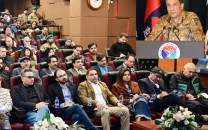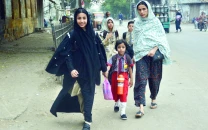The cyclone that broke Pakistan’s back
Few Pakistanis even know of it by name. Fewer still remember that it eventually contributed to Pakistan’s break-up.

The cyclone that broke Pakistan’s back
It happened in Pakistan. Yet few Pakistanis even know of it by name. Fewer still remember that it eventually contributed to Pakistan’s break-up. The 1970 Cyclone Bhola hit then East Pakistan on November 12, 1970.
Historians tend to agree that although there were many other forces at work, the devastation caused by the cyclone and the widespread view that the government had mismanaged the relief efforts and West Pakistan had generally shown an attitude of neglect, contributed to high levels of anti-West Pakistan feeling, a sweeping victory for the Awami League, and eventually the breakup of Pakistan and the creation of Bangladesh.
Such, then, are the forces of nature. And such are the forces of history.
As we hear newspaper headlines proclaiming the historic magnitude and devastation wrought by the floods on our plains, it is worth remembering that 40 years ago The New York Times was describing another calamity in Pakistan as the “worst catastrophe of the century”. Much more importantly, we should pay close attention to the lessons of history, and the lessons of nature.
The lesson of how policy mismanagement led to public dissatisfaction and eventually contributed to national dismemberment. Of course, this is not an entirely parallel situation since so much more had already gone wrong in the East Pakistan case — and the cyclone was a contributor to, not the cause, of how history unfolded — but Bhola’s lessons should not be lost on the politicians, policy-makers and people of Pakistan.
There is a reason why disasters require national solidarity. Without it, they can become even more disastrous. Deeply buried fissures in the social fabric can burst forth in volcanic anger. As we look around at the political, policy and citizen response to the current floods, one sees too many who wish to turn disaster into a political opportunity. Those who do would be well advised to remember Bhola. Indeed, we would all be well advised to remember Bhola.
History is not a predictive science. And I do not believe that there is a real parallel between the two situations.
But I do believe that there are important lessons to learn from our own mistakes. For the sake of our present, if not of our past, let us resolve not to make the same mistakes again. Let us not forget what is the real lesson of Bhola in 1970, as of so many other tragedies: dissatisfaction in times of crisis can be a force of agony, and political catastrophe can sometimes grow from seeds sown in natural disaster.
Published in The Express Tribune, August 18th, 2010.
















COMMENTS
Comments are moderated and generally will be posted if they are on-topic and not abusive.
For more information, please see our Comments FAQ